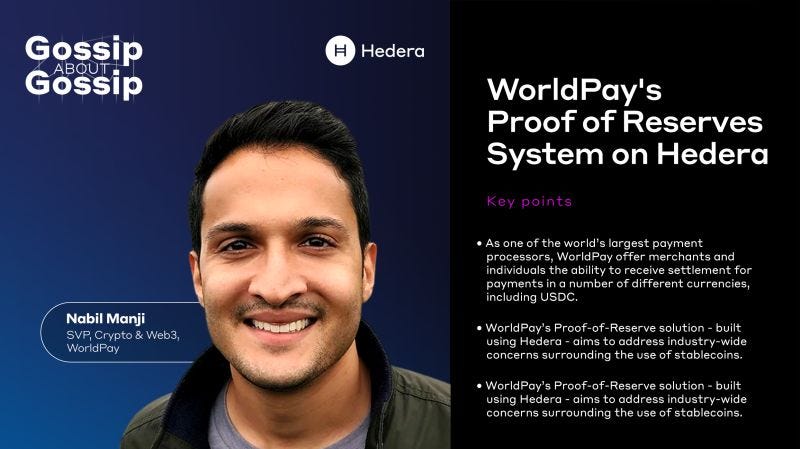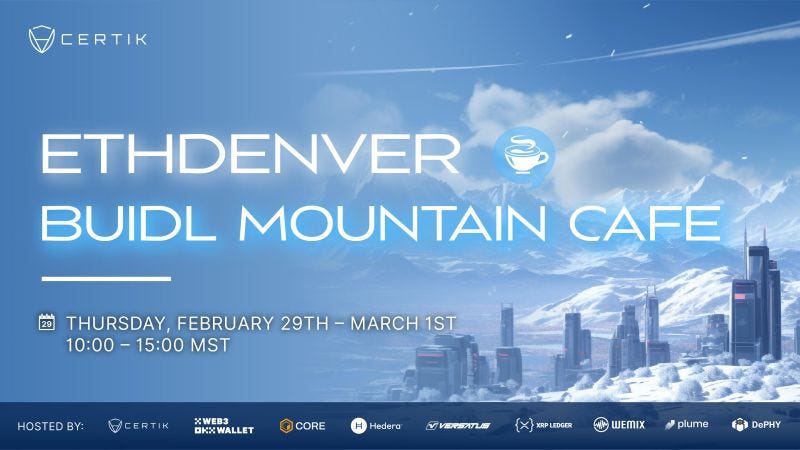Happy Friday Hedera family! To our friends and relatives who celebrate, Happy Lunar New Year, and here’s wishing you health, prosperity, and good fortune for the new year.
Of course, I have to make a plug to please share the job req below with your networks. I am beyond excited to be hiring for a Senior Director of public Relations, as the Hedera and Swirlds Labs ecosystems continue to grow. If you are a PR rockstar (or know one) with BOTH Web3 and enterprise software experience, I hope you'll give it a look!
🙌🏽 https://swirldslabs.com/careers/?gh_jid=7193960002 🙌🏽
This week on the 'Gossip about Gossip' podcast, I welcomed Worldpay Head of Crypto and Web3, Nabil Manji, to dive into WorldPay’s Proof of Reserves solution - bringing increased trust and transparency to payment settlement and addressing stablecoin uncertainty using the Hedera network.
🎙️ https://lnkd.in/dbgSnZ9U
Swirlds Labs released Episode 2 of “First Principles” with Hedera Co-founders Dr. Leemon Baird and Mance Harmon. In this episode they dive into the fundamentals of #AI, detailing their history within the space and sharing their insight on how AI has evolved, where it is today, and what it might look like in the future.
If you’re going to ETHDenver later this month, join Hedera alongside leading #web3 projects and protocols - at the ETHDenver BUIDL Mountain Café for a co-working experience where you can meet like-minded blockchain enthusiasts, developers and industry leaders!
📆 Feb 29th - Mar 1st | 10:00 - 15:00 MST
Register now ✍️ https://lu.ma/45joyzh2
In this week’s news from around the Hedera ecosystem, in a two-part series from Kitco News, Jordan Finneseth delves into the burgeoning interest in real-world asset tokenization, paving the way for a market estimated to be worth between $3.5 trillion USD and $10 trillion USD by 2030. Shayne Higdon, Co-founder and CEO of the HBAR Foundation, emphasizes the need for seamless integration and a paradigm shift in business. The spotlight then shifts to the Caribbean, where discussions on decentralized finance at Oasis Onchain and Fintech Islands conferences reveal the region's strides toward innovation. Hedera's role in reshaping trade finance is highlighted by Shayne Higdon in an article from Global Finance Magazine, emphasizing the efficiency and transparency brought by Web3, AI, and other digital innovations. The HBAR Foundation's Director of Sustainable Impact, Hania Othman, explores the potential of distributed ledger technology in reducing global carbon emissions in a byline for Earth.org. Additionally, the Sin City Crypto Podcast features Eric Piscini, Chief Revenue Officer of Hedera, discussing recent developments, including Hitachi joining the Governing Council. The strategic partnership between The Hashgraph Association and the Ministry of Investment of Saudi Arabia is unveiled, marking a significant step towards fostering innovation, economic growth, and technological development in the Kingdom. Finally, renowned musician A.R. Rahman teases the launch of his upcoming music platform on Hedera, promising transparency and fair compensation for artists, showcasing the platform's potential to reshape the future of the music industry.
In this two-part article discussing real-world asset tokenization, Jordan Finneseth of Kitco News wrote about how the launch of the Bitcoin exchange-traded funds (ETFs) ushered in a new era of legitimacy for digital assets, giving institutional investors a simple and familiar way to access the asset class. However, Jordan writes that the bigger story may be the growing interest in real-world asset (RWA) tokenization, which harnesses Web3 technology to record any financial asset on an immutable decentralized ledger, introducing a new level of functionality to everything from stocks to real estate. Finneseth explored the concept of digitizing assets like treasuries and stocks, enabling them to be hosted on Web3 protocols such as distributed ledgers and utilized in decentralized finance (DeFi), and covered some of the main use cases currently available to investors.
Shayne Higdon, Co-founder and CEO of the HBAR Foundation, spoke with Jordan and said, “The total available market for real-world assets is estimated to be worth between $3.5 trillion USD and $10 trillion USD by 2030, making it one of the largest market opportunities. Currently, the estimated value of the tokenized assets market is over $100 billion USD,” he said. “However, there is significant work needed to address current shortfalls in the user experience, and to enable seamless and transparent tokenization. It’s not merely technology integration that’s required – in many cases, a complete business shift is necessary.”
In the second part of this article, Jordan Finneseth delved deeper into the future of tokenization and how it will factor into the adoption of blockchain technology and cryptocurrencies moving forward.
Shayne Higdon, Co-founder and CEO of the HBAR Foundation added “The merging of the TradFi and DeFi ecosystems seems inevitable, with tokenization being the most logical starting point. For DeFi assets to become viable capital without exorbitant interest rates, greater stability and regulation are required. While the returns in DeFi are great, the risks are also substantial. Businesses consistently seek faster, cheaper, and more secure ways of operating. This is certainly true in the banking world. If a bank can shave 200-300 basis points off of billions of daily transactions then the business will be more capital efficient and profitable. The shift toward digital representation on Web3 technologies aligns with these business objectives, therefore it’s hard to imagine that businesses, and shareholders in particular, would not be on board with this.”
Forbes: Crypto Carib Hotter Than Davos
This week, decentralized finance was the major discussion point at two conferences in the Bahamas and Barbados. On the heels of the World Economic Forum in Davos, Oasis Onchain, a three-day summit focused on retail consumers and culture, kicked off on the “Crypto Isle,” otherwise known as Nassau, Bahamas. Enthusiastic island hoppers also made their way to the Fintech Islands conference in Barbados, which began two days later and where innovations in payments infrastructure took center stage.
Like other nations in the Caribbean, Haiti's government is taking steps to innovate and digitize its payment infrastructure, and a central bank digital currency (CBDC) is part of that equation. A cross-border digital payment aggregator, CellPay, and other entities are eying this prospect, as the vibrant local fintech sector emerges. Georges Andy René, CEO of HaitiPay, a Central Bank-regulated local fintech which is powered by Hedera said, "With a $20 billion USD Gross Domestic Product, we estimate that the total transaction value in the Digital Payments market in Haiti will reach $4 billion USD by 2024,"
This week, Hania Othman, Director of Sustainable Impact Europe/Africa at The HBAR Foundation, wrote a byline for Earth.org, discussing how distributed ledger technology (DLT) could be the key to reducing global carbon emissions amid the race to achieve the goals of the 2015 Paris Agreement. Hania outlined how the COP28 conference in Dubai, marked a crucial point in initiating a global dialogue around how countries can reduce their carbon emissions and accelerate efforts to achieve global carbon neutrality. She mentioned how the use of tokenization, for instance, in conjunction with integrated data Measurement, Reporting, and Verification (dMRV), offers a promising method to establish a public ledger for emission data. This approach can ensure uniformity in technical frameworks and utilize the inherent features of distributed ledgers – such as auditability, discoverability, and liquidity in emission offsetting and sustainability reporting scenarios. Additionally, Hania detailed how the current system struggles with adequately verifying diverse attributes, which ultimately affects the effective accountability of both polluters and governmental entities.
Global Finance Magazine: Trade Finance: A New Day
In this article by the Global Finance Magazine, journalist Andrew Singer highlights how new technologies are reshaping the way goods and services are tracked around the world and opening new options for financing global trade. With the emergence of Web3, AI, and other digital innovations, trade finance is becoming more efficient, transparent, and accessible. These advancements enable quicker transactions, reduced costs, and enhanced security, benefiting businesses worldwide. Additionally, emerging digital platforms facilitate easier collaboration between parties involved in trade, fostering smoother operations and risk mitigation. As a result, the landscape of trade finance is evolving rapidly, offering new opportunities for growth and development across global commerce.
Shayne Higdon, co-founder and CEO of the HBAR Foundation spoke with Andrew on the topic and said, “Current trade finance systems are fragmented, siloed, and leave the tail end of the market chronically under-addressed.” Speaking on how tokenization is transforming trade finance, Shayne said, “Tokenization, combined with the programmability of smart contracts (that run on blockchains), simplifies trade finance. In time, it might allow farmers and SMEs to focus more time on their core business rather than focusing on how to fund themselves appropriately.” Fresh Supply Co, for instance, one of HBAR’s grantees, has created such a network in the agrifood area. According to Shayne, “Their platform gathers data points from production to delivery to manage credit risk and tokenizes the assets produced—salmon or avocados, for example — to be used as collateral for lending. Not only do farmers get much needed credit, but they also receive timely payments when their goods are received.”
Sin City Crypto Podcast: Hedera Hashgraph Update w/Eric Piscini (Solana Outage!)
This week, Eric Piscini, Chief Revenue Officer of Hedera, joined the Sin City Crypto Podcast to provide an update on the Hedera ecosystem and discuss Hedera’s recent announcements. These included the recent announcement of The Hashgraph Association launching a $250 million USD 5-year deal with Saudi Arabia’s Ministry of Investment along with Hitachi joining Hedera’s Governing Council and what this means for the ecosystem, and more. The show, co-hosted by David Abaghanyan and Robin Kline, is one of the top sources of entertaining content on all things crypto with thousands of listeners tuning in every week.
On the Saudi announcement, Eric said, “This is a really big deal, and we are really excited. What’s interesting to me are three things, the first being that it’s part of a much larger initiative from the Saudi government to build the next version of the infrastructure for financial markets. They picked Hedera to be the underlying infrastructure for the blockchain and crypto projects part of that infrastructure. The second thing part is that there is huge competition in the Middle East region on who is going to be the next financial center and the next blockchain and crypto center…. the last part is that they already picked very specific use cases that they want to work on with us, especially on the tokenization of real-world world assets.”
The Hashgraph Association (THA) has unveiled a significant strategic partnership with the Ministry of Investment of Saudi Arabia. This collaboration marks a pivotal moment in the advancement of DLT within the Kingdom. By joining forces, the pair aim to foster innovation, economic growth, and technological development on a national scale. The partnership underscores Saudi Arabia's commitment to embracing emerging technologies and becoming a global leader in the digital economy. With Hedera's innovative consensus mechanism and the Kingdom's progressive vision, the collaboration is poised to drive forward various sectors, including finance, government services, and beyond. This strategic alliance not only positions Saudi Arabia at the forefront of blockchain adoption but also signifies a transformative step toward building a more efficient and technologically advanced society. Together, they pave the way for a future where decentralized technologies can play a central role in shaping the economic landscape of the region.
Crypto News Z: AR Rahman Teases His Upcoming Music Platform On Hedera
In an exciting development, renowned musician A.R. Rahman hinted at the launch of his upcoming music platform on Hedera. Rahman's initiative promises to revolutionize the music industry by leveraging Web3 technology for transparency and fair compensation for all artists. The platform is expected to provide a unique ecosystem for creators and listeners, fostering a direct connection while ensuring artists receive proper recognition and rewards for their work. With Rahman's global success and the innovative potential of DLT, this venture holds promise for reshaping the future of the music industry.





